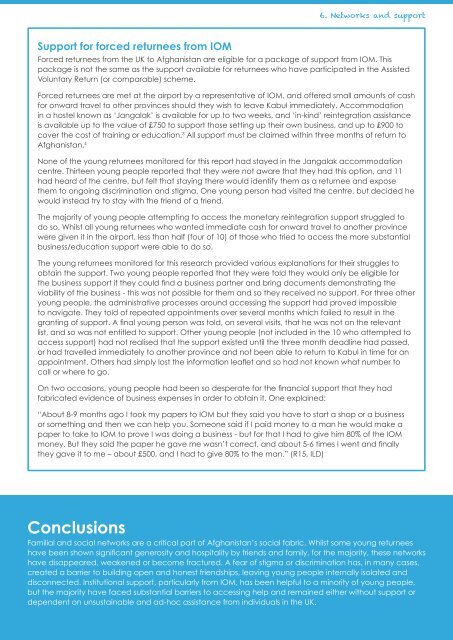After Return
After%20Return_RSN_April%202016
After%20Return_RSN_April%202016
Create successful ePaper yourself
Turn your PDF publications into a flip-book with our unique Google optimized e-Paper software.
6. Networks and support<br />
Support for forced returnees from IOM<br />
Forced returnees from the UK to Afghanistan are eligible for a package of support from IOM. This<br />
package is not the same as the support available for returnees who have participated in the Assisted<br />
Voluntary <strong>Return</strong> (or comparable) scheme.<br />
Forced returnees are met at the airport by a representative of IOM, and offered small amounts of cash<br />
for onward travel to other provinces should they wish to leave Kabul immediately. Accommodation<br />
in a hostel known as ‘Jangalak’ is available for up to two weeks, and ‘in-kind’ reintegration assistance<br />
is available up to the value of £750 to support those setting up their own business, and up to £900 to<br />
cover the cost of training or education. 3 All support must be claimed within three months of return to<br />
Afghanistan. 4<br />
None of the young returnees monitored for this report had stayed in the Jangalak accommodation<br />
centre. Thirteen young people reported that they were not aware that they had this option, and 11<br />
had heard of the centre, but felt that staying there would identify them as a returnee and expose<br />
them to ongoing discrimination and stigma. One young person had visited the centre, but decided he<br />
would instead try to stay with the friend of a friend.<br />
The majority of young people attempting to access the monetary reintegration support struggled to<br />
do so. Whilst all young returnees who wanted immediate cash for onward travel to another province<br />
were given it in the airport, less than half (four of 10) of those who tried to access the more substantial<br />
business/education support were able to do so.<br />
The young returnees monitored for this research provided various explanations for their struggles to<br />
obtain the support. Two young people reported that they were told they would only be eligible for<br />
the business support if they could find a business partner and bring documents demonstrating the<br />
viability of the business - this was not possible for them and so they received no support. For three other<br />
young people, the administrative processes around accessing the support had proved impossible<br />
to navigate. They told of repeated appointments over several months which failed to result in the<br />
granting of support. A final young person was told, on several visits, that he was not on the relevant<br />
list, and so was not entitled to support. Other young people (not included in the 10 who attempted to<br />
access support) had not realised that the support existed until the three month deadline had passed,<br />
or had travelled immediately to another province and not been able to return to Kabul in time for an<br />
appointment. Others had simply lost the information leaflet and so had not known what number to<br />
call or where to go.<br />
On two occasions, young people had been so desperate for the financial support that they had<br />
fabricated evidence of business expenses in order to obtain it. One explained:<br />
“About 8-9 months ago I took my papers to IOM but they said you have to start a shop or a business<br />
or something and then we can help you. Someone said if I paid money to a man he would make a<br />
paper to take to IOM to prove I was doing a business - but for that I had to give him 80% of the IOM<br />
money. But they said the paper he gave me wasn’t correct, and about 5-6 times I went and finally<br />
they gave it to me – about £500, and I had to give 80% to the man.” (R15, ILD)<br />
Conclusions<br />
Familial and social networks are a critical part of Afghanistan’s social fabric. Whilst some young returnees<br />
have been shown significant generosity and hospitality by friends and family, for the majority, these networks<br />
have disappeared, weakened or become fractured. A fear of stigma or discrimination has, in many cases,<br />
created a barrier to building open and honest friendships, leaving young people internally isolated and<br />
disconnected. Institutional support, particularly from IOM, has been helpful to a minority of young people,<br />
but the majority have faced substantial barriers to accessing help and remained either without support or<br />
dependent on unsustainable and ad-hoc assistance from individuals in the UK.<br />
<strong>After</strong> <strong>Return</strong> 25


